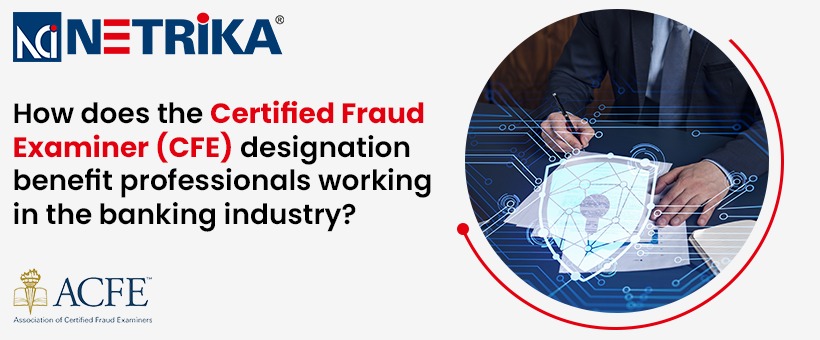News & Events
How does the Certified Fraud Examiner (CFE) designation benefit professionals working in the banking industry?
- January 1, 2024
- Posted by: marketing@netrika.com
- Category: Blogs

the Certified Fraud Examiner (CFE) credential is one of the most prestigious and in-demand anti-fraud credentials in the world. Employers, clients, and peers can see that the holder of the CFE accreditation has the expertise to identify and prevent fraud. In the ever-evolving world where companies confront several challenges in guarding against deceit and fraud, professionals with specialist training and qualifications are invaluable assets in the fight against these dangers. Of these, persons with the credentials of being a Certified Fraud Examiner (CFE) are particularly helpful as resources when it comes to detecting and preventing fraud.
Here is how a certified fraud examiner designation benefits professionals working in the banking industry-
1. Enhanced Fraud Detection Abilities: It has been shown that combining the knowledge of a banking professional with a certified fraud examiner can be quite effective in spotting fraudulent activity. CFEs are skilled at deciphering financial transactions, looking into accounting discrepancies, and seeing patterns that can point to fraudulent activity. Simultaneously applying both skill sets of advanced banking knowledge and fraud investigation can help build a thorough grasp of complicated fraud scenarios, which could result in faster and more accurate detections.
2. Strengthening Investigative Interviews: Interviews are essential to the collection of information from witnesses and suspects as well as the acquisition of evidence in fraud investigations. An examiner who has received training in banking processes and fraud examination can approach interviews from a variety of angles. The CFE certification guarantees that the examiner inquires about financial concerns and fraudulent actions pertinently and offers guidance when constructing exam questions to specifically address the problem being investigated. The integrated skill set enables more insightful and successful interviews, which improves case resolution and decision-making.
3. Establishing Credibility and Trust: Professionals with notable credentials and experience are highly valued by organisations. A person’s reliability and reputation are increased by holding dual qualifications as a banking professional and a certified fraud examiner. Employers can have faith in their competence to manage intricate fraud cases and carry out trustworthy investigations.
4. Variety of Career Options: Those looking to make a difference in the field of fraud detection and investigation have a wide range of career options thanks to the CFE certification for banking professionals certifications. Professionals with both qualifications can find employment in a variety of settings, such as private banks, government banks, insurance companies, corporate fraud investigation teams, and law enforcement organisations. People with this combination of financial knowledge and banking skills are in great demand in a wide range of sectors.
5. Improved Team Collaboration: Multidisciplinary teams with a range of specialisations are frequently involved in fraud investigations. Individuals with these two certifications can act as liaisons between investigators, attorneys, and financial specialists. They can work together fluidly to detect fraudulent activity and successfully explain complicated financial concerns to team members who are not in the financial field. By working together, the investigation process becomes more effective, which benefits the organisation by enabling it to recover losses and put mitigation procedures in place to stop fraud in the future.

